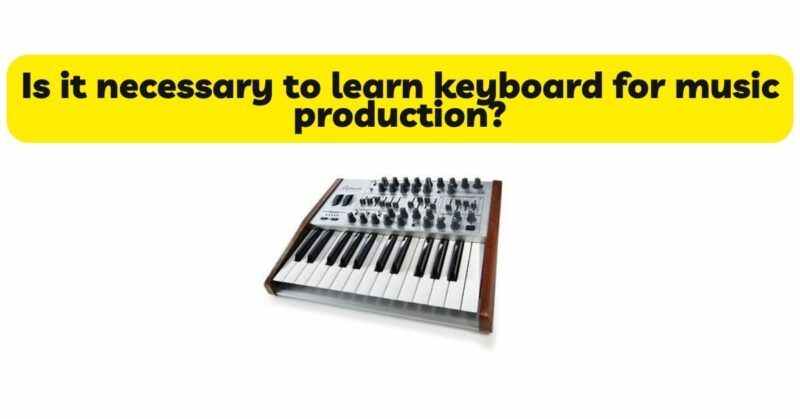In the realm of music production, technological advancements have revolutionized the creative process, providing aspiring producers with an array of tools and software. However, a fundamental question arises: Is it necessary to learn keyboard skills for music production? In this article, we will explore the importance of keyboard proficiency in the context of music production. From understanding musical theory to enhancing creativity and workflow, we will uncover the advantages that keyboard skills offer to aspiring producers.
I. The Foundation of Musical Theory:
One of the key benefits of learning the keyboard for music production lies in its ability to serve as a foundation for understanding musical theory. The keyboard provides a visual representation of musical concepts such as scales, chords, and intervals. By familiarizing oneself with these concepts on the keyboard, producers gain a deeper understanding of harmony, melody, and rhythm. This knowledge empowers them to make informed decisions when composing, arranging, and manipulating musical elements in their productions.
II. Enhancing Melodic and Harmonic Composition:
The keyboard acts as a powerful tool for composing melodies and harmonies. The ability to play melodies and chords in real-time allows producers to experiment, improvise, and explore different musical ideas. By directly interacting with the keyboard, producers can intuitively find melodic phrases, create chord progressions, and experiment with harmonic variations. This hands-on approach not only fosters creativity but also enables producers to quickly capture and develop musical ideas during the production process.
III. Streamlining Workflow and Music Production Techniques:
Efficiency and workflow optimization are essential aspects of music production. Learning the keyboard can significantly enhance these elements by providing a tangible interface for controlling software instruments and virtual synthesizers. Keyboard skills allow producers to play and record parts directly, enabling faster arrangement and composition. Furthermore, the keyboard facilitates the exploration of different sounds, textures, and articulations, enabling producers to experiment and sculpt their tracks with precision and expressiveness.
IV. Performing Live and Remixing Opportunities:
Keyboard proficiency opens doors to live performance and remixing opportunities. In live settings, the ability to play and manipulate musical elements in real-time provides an engaging and dynamic experience for both the performer and the audience. By incorporating keyboard skills into live performances, producers can improvise, trigger samples, and add expressive elements to their music. Additionally, in the realm of remixing, keyboard skills allow producers to deconstruct existing tracks, create new arrangements, and add personal touches that elevate their remixes to new artistic heights.
V. Collaboration and Communication with Musicians:
Collaboration is a crucial aspect of music production, often involving working with vocalists, instrumentalists, and other producers. Keyboard skills facilitate effective communication and collaboration with musicians. When discussing musical ideas or conveying specific musical directions, being able to communicate using common musical terminology and demonstrating ideas on the keyboard helps bridge the gap between different musicians. This shared musical language fosters more meaningful collaborations and enables seamless integration of live performances or instrumental recordings into the production process.
VI. Nurturing Musicality and Creativity:
Learning the keyboard nurtures musicality and creativity in music production. The tactile experience of playing an instrument allows producers to connect with music on a deeper level, enabling them to express emotions and explore different sonic possibilities. Keyboard skills unlock the potential for improvisation, experimentation, and innovative compositions, fostering a unique artistic voice. By honing their keyboard skills, producers can tap into their musical intuition, leading to more inspired and authentic productions.
Conclusion:
While it is not an absolute necessity to learn the keyboard for music production, its advantages cannot be overlooked. From laying a solid foundation in musical theory to enhancing creativity, streamlining workflow, and enabling collaboration, keyboard skills empower producers to excel in their craft. The keyboard serves as a gateway to musical expression, enabling producers to unlock their full potential and create compelling and evocative compositions. Whether you are a beginner or an experienced producer, investing time and effort into learning the keyboard will undoubtedly enrich your musical journey and elevate your productions to new heights.


